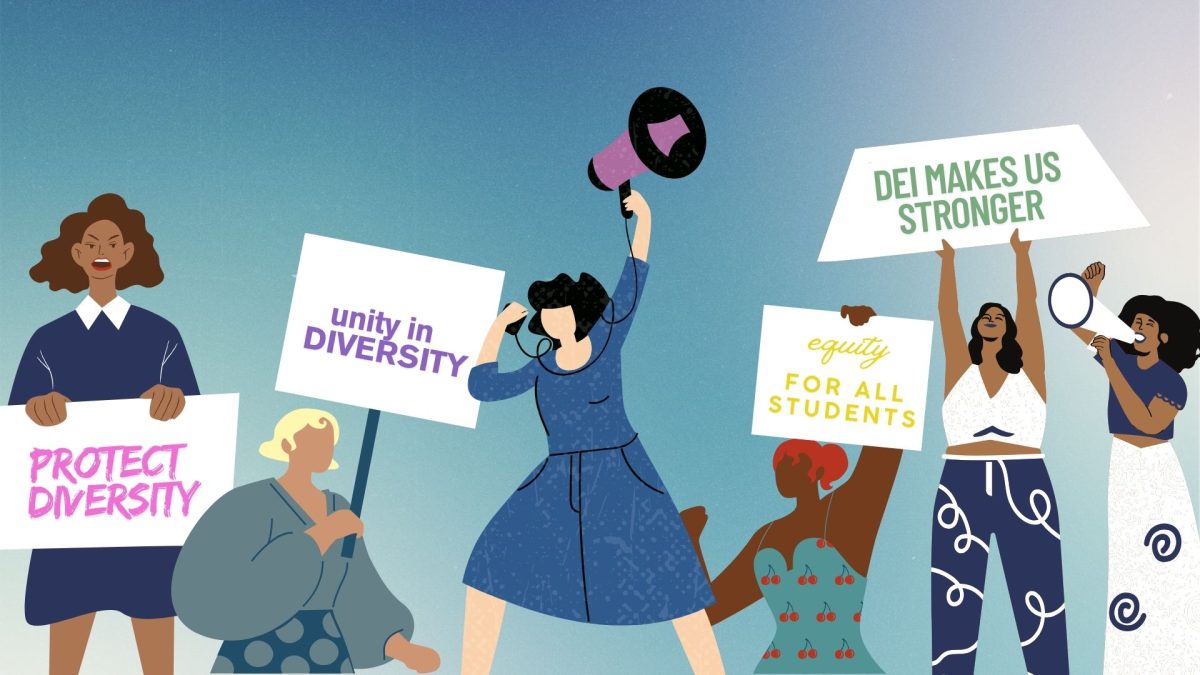Controversy arose during this year’s college decision season when colleges began eliminating their Diversity, Equity, and Inclusion (DEI) programs.
The reverse DEI programs began on January 20, 2025, when President Donald Trump issued an executive order titled “Ending Radical and Wasteful Government DEI Programs and Preferencing.” This marked the beginning of a systematic effort to eliminate DEI initiatives from federal operations.
Politically, some adults, particularly politicians and policymakers, believe that DEI programs create an unfair advantage instead of treating everyone equally and actually lead to reverse discrimination.
Economically, these adults argue that funding DEI programs draws resources from other priorities like education, public safety, and infrastructure.
In contrast, supporters of college and university DEI programs believe the DEI initiatives provide support networks for marginalized students. Initiatives like LGBTQ+ housing floors, cultural resource centers and scholarships aimed at increasing representation were a source of comfort for many.
DEI efforts were originally intended to promote fairness and inclusion across the board, often including various groups facing discrimination.
With these programs being stripped away from many states, some FSHA seniors are left wondering: How will removing DEI programs affect their college experience, and why does it feel like nobody is talking about it?
This rollback has left these seniors wondering what kind of campus climate they will encounter in the fall.
“I’m wondering if my college experience will be different because of the removal. When touring colleges, DEI was a priority for each school, highlighted through different programs. With the removal, I wonder how this will change college for me,” Nicole Logan ‘25 said.
The impact of this removal depends on the college or university. Some will keep supporting diversity in different ways, while others may shift the way students experience life on campus.
Some institutions have refused to eliminate their DEI programs. Amid political pressure, the University of California system reaffirmed its commitment to inclusion. And private institutions like Emerson College and Wesleyan University continue to prioritize diversity programming.
Some students who identify as LGBTQ+ or belong to marginalized communities feel that the removal of DEI has limited their options.
“I cannot speak for anyone else, but this is something I have been quite concerned about while formulating my college list, and now that I am hearing back from schools.” Zara Savadian ‘25 said.
Others, however, admitted they hadn’t thought about DEI removal as a major factor in their decision-making.
“I heard about it, but I didn’t connect it to my college search,” one senior explained. “Now that I think about it, I guess it could affect campus life.”
Despite the significant implications for college-bound students, FSHA alum Caitlin Norton ‘24, who attends Emerson College, noted that discussions around DEI removal have been largely absent from college decision conversations.
“DEI removal doesn’t get talked about much in college decisions because unfortunately, for some, it’s just not something that feels personal to them– it’s easy to overlook.” Norton said.
From a broader perspective, FSHA faculty provided insight into seniors’ reactions to the disappearance of DEI.
“To be fair, I haven’t really heard too many seniors talking about it, but at the same time, I think it usually concerns them with the possibility of majors being affected in college.” Ms. Katharine Guerrero, Director of Mission and Belonging, said.
Ms. Guerrero also shared that there is a concern amongst students with the removal of DEI in the context of mental health.
“One thing I have heard from seniors is their concern about mental health,” she said. “I think that it’s a general concern, but I think now, when we’re thinking about the whole diversity, equity, and inclusion, being labeled as illegal or unnecessary creates a divide in many individuals’ well-being,” Guerrero said.
The college counselors emphasized that students applying to colleges in states with DEI rollbacks should research campus climate and available resources before making final decisions.
“Research is extremely important when applying to colleges. You can look at their school profiles and see what clubs or organizations they have, and also look at their mission statements.” Ms. Paula Mora, 11th Grade Counselor, said.
One FSHA teacher emphasized the growing connection between DEI rollbacks and broader political shifts.
“Columbia University has expelled, suspended, revoked the diplomas (‘temporarily’) of students who participated in on-campus protests supporting the Palestinian people,” Mrs. Stephanie Gonzalez Doo, Social Studies teacher, said. “A Fulbright scholar working on her Ph.D from Tufts University was detained and arrested by ICE outside her home for writing an opinion piece for the university’s newspaper. This is all related, and if a student is considering going to a politically active campus, they need to be prepared for the reality of this moment.”
Zara, the president of FSHA’s Queer Student Alliance (QSA), also shared insightful information on their viewpoint of DEI programs.
“I feel like this definitely has a negative impact on queer students since DEI programs aim to create safe spaces on campuses. Without that, it might be difficult to feel entirely safe, especially for students in more prejudiced areas,” Savadian ‘25 said.
And with rising political tensions on many campuses, individuals are realizing that these issues don’t stop at DEI.
“What we are seeing is colleges not only reversing or limiting their DEI programs, but coming down hard on the freedom of speech in order to appease the new administration,” Mrs. Gonzalez Doo said.
Looking ahead, FSHA seniors who value DEI hope colleges will find ways to maintain inclusive environments despite legislative changes. In the meantime, they encourage underclassmen to research and prioritize schools that align with their values.
As graduation approaches, FSHA students are stepping into a changing college landscape where the role of DEI remains uncertain. Whether or not more students begin to care about this issue remains to be seen, but for those directly affected, the impact is undeniable.


